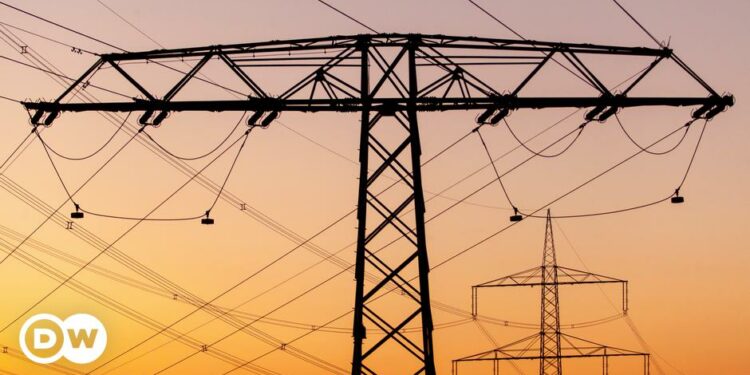To view this video please enable JavaScript, and consider upgrading to a web browser that supports HTML5 video
Kaspars Melnis, Latvia’s minister for climate and energy, said the Baltic countries are a “small market for the electricity,” so the disconnecting project is about “defense, energy security, independence and the economy.” Recent events in Ukraine had shown that “the decision to switch off was the right one,” he told DW.
Melnis doesn’t expect leaving the BRELL system will affect electricity prices. If anything, new renewables coming online soon could mean lower prices by the end of the year, he said.
‘Staying connected was a vulnerability’
By placing all their bets on the EU’s electricity grid, the three states are demonstrating their European ties while further distancing themselves from Russia and their Soviet past.
Since independence, they have been leery of Russia and its influence over the region. After Russia’s invasion of Ukraine in 2022, Moscow withheld natural gas and went after Ukraine’s energy infrastructure, forcing the Baltics to invest in non-Russian alternatives to secure their energy infrastructure.
Connecting electricity grids requires a renewal of physical infrastructure, as systems often run on different frequencies and voltage levelsImage: Carsten Rehder/dpa/picture alliance
Kristine Berzina, managing director of the German Marshall Fund’s Geostrategy North project, said before the war many in the region weren’t sure whether disconnecting from the Russian system and grid was “worth it.”
“Citizens don’t like paying extra for energy infrastructure, and politicians have a hard time explaining why changes are necessary if things seem to be working,” she told DW.
But Russian belligerence forced the Baltics to take measures to ensure an uninterrupted flow of electricity. “Being connected means being tied to an adversary that claims that the Baltic states shouldn’t exist,” said Berzina, adding that “staying connected was a vulnerability.”
Additionally, suspected sabotage to critical undersea cables in the Baltic Sea has put Europe and NATO on edge and has led to increased sea surveillance.
NATO moves to protect Baltic sea cables
To view this video please enable JavaScript, and consider upgrading to a web browser that supports HTML5 video
For the Baltics, energy independence means diversifying energy suppliers and diversifying the energy mix, plus the ability to integrate more renewables like solar and wind energy. It also allows them to take part in the EU’s common electricity market.
By 2030, the EU has set a target for all members to be able to import or export at least 15% of the electricity produced on its territory to other EU countries. Brussels has supported the Baltic states’ efforts with €1.23 billion ($1.28 billion) of investments in connections to Europe that will give Lithuania, Latvia and Estonia more options for a reliable power supply. A bigger energy mix will ensure a steady flow of electricity.
Existing links, Poland’s help and sabotage
The Baltics’ main connection with the EU grid will be via the overhead transmission line LitPol Link that connects Poland and Lithuania, which share a common border.
The three countries are also connected to the Scandinavian electricity market, which is a market of its own. Lithuania has an undersea link to Sweden called NordBalt, while Estonia has two direct undersea links to Finland — Estlink 1 and Estlink 2 — with a third connection expected to be finished by 2035.
However, the Estlink 2 cable was damaged in December, drastically reducing capacity between Estonia and Finland. A day after the incident, the European Commission released a statement saying that a ship involved was part of Russia’s shadow fleet of vessels.
In January, Lithuania decided to protect the Alytus switchyard and transformer substation of the critical LitPol interconnector to PolandImage: David Ehl/DW
The Commission was quick to say that the attack on critical infrastructure would not stall the planned disconnection from the Russian grid because of the extra capacity the Baltic states have built up over the years. “There is no risk to the security of electricity supply in the region,” said a Commission statement.
Berzina said the three Baltic countries have “done a lot” over the past two decades to secure their energy supply, while at the same time allowing for “more competition in the electricity sector.”
Due to the “de-Russification” of energy sources and routes, she added, “energy sector competition policy has been very geopolitically powerful.”
Juri Rescheto also contributed to this report from Riga.
Edited by: Uwe Hessler
Source link : http://www.bing.com/news/apiclick.aspx?ref=FexRss&aid=&tid=67a7d0432e144318a8e145383db7919f&url=https%3A%2F%2Fwww.dw.com%2Fen%2Fbrell-lithuania-latvia-and-estonia-turn-off-russian-electricity%2Fa-71498635&c=4787980596320194449&mkt=de-de
Author :
Publish date : 2025-02-08 03:35:00
Copyright for syndicated content belongs to the linked Source.



